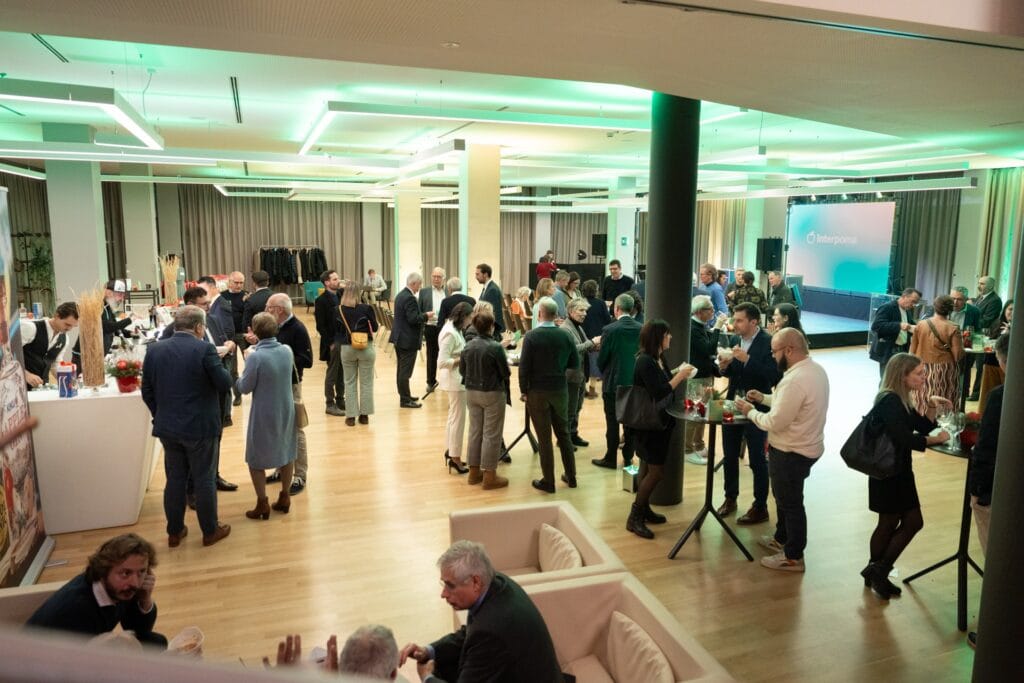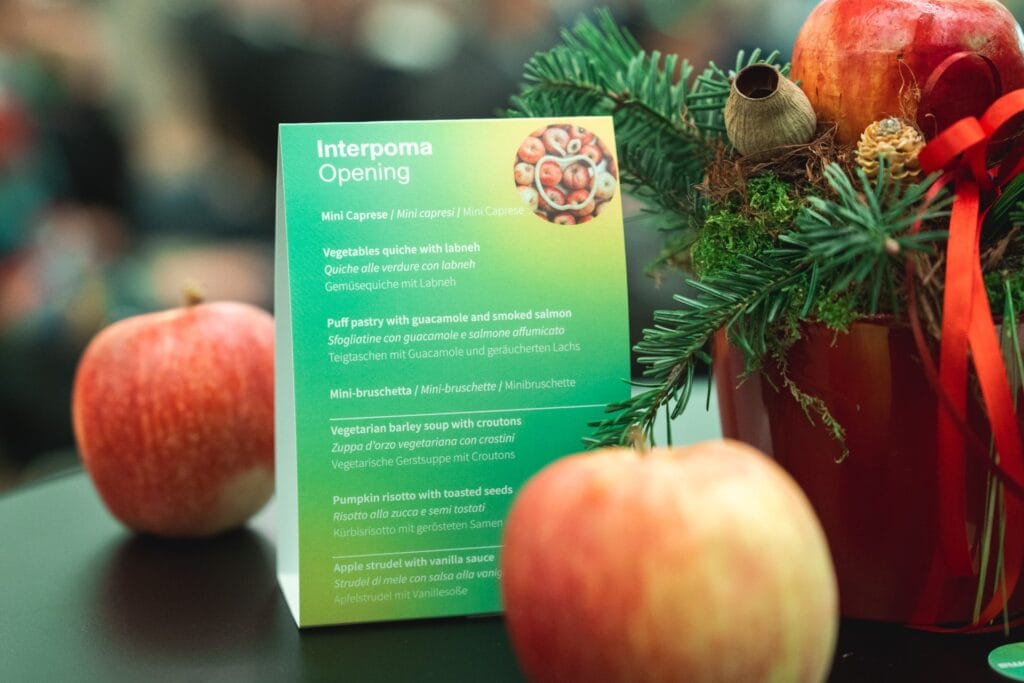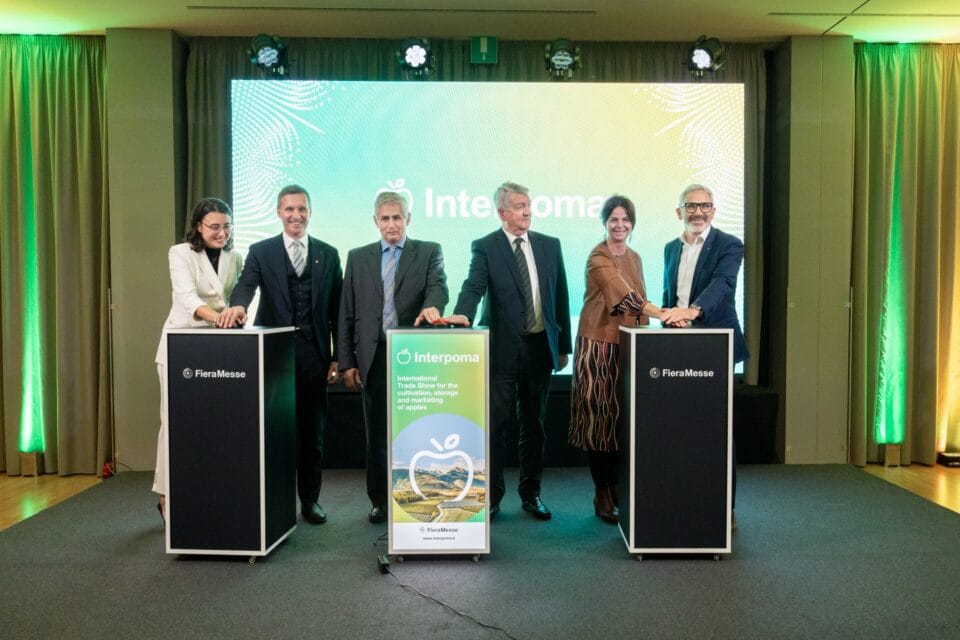The 13th edition of Interpoma, the world’s leading apple trade show, opened yesterday in Bolzano (Italy) with a deep dive into the state of the global apple market. Running through November 23, the event features key insights from industry leaders as they address shifting market dynamics, challenges, and opportunities in the 2024/2025 apple harvest, writes EastFruit.
 The President of Fiera Bolzano Greti Ladurner held the opening speech and highlighted the event’s importance on the world stage. She was followed by Francesco Lollobrigida, the Italian Minister for Agriculture, Food Sovereignty, and Forests, who reiterated the apple-growing industry’s importance – a symbol of Italy’s quality and sustainability – as well as acknowledging Interpoma’s prestige and uniqueness.
The President of Fiera Bolzano Greti Ladurner held the opening speech and highlighted the event’s importance on the world stage. She was followed by Francesco Lollobrigida, the Italian Minister for Agriculture, Food Sovereignty, and Forests, who reiterated the apple-growing industry’s importance – a symbol of Italy’s quality and sustainability – as well as acknowledging Interpoma’s prestige and uniqueness.
 The Opening Night also provided an update about international apple harvest figures, data which was first shared during the Prognosfruit in Budapest.
The Opening Night also provided an update about international apple harvest figures, data which was first shared during the Prognosfruit in Budapest.
Philippe Binard, Secretary General of the WAPA (World Apple and Pear Association) started by sharing apple-growing figures in the European Union. He confirmed that this year’s harvest was unique when compared to the previous ones – apple availability on the fresh fruits and processed fruits markets has dropped. The overall drop is mainly seen for two major varieties: Golden Delicious and Gala, which have respectively shrunk by 10% and 11% compared to 2023. However, the Red Delicious yield has increased by 20%, while new varieties have maintained the harvest record they experienced last year. Everyone agrees that the cause for this drop in yield is adverse weather which characterized the harvest season, especially spring frost which impacted most of Europe.
 The YOY apple stock as of November 2024 is lower across many countries – indicative of lower yields – except for Italy, Spain, and Switzerland, whose stock levels have increased compared to the previous year. Giovanni Missanelli, Assomela, informed the audience about Italy’s slightly higher yield vis-a-vis data shared in August, reaching around 2.248.000 tons, boasting overall good size and great quality. The figures for South Tyrol are in line with those from the previous year, while Trentino experienced a dip. Piedmont, Veneto, and Emilia-Romagna have registered higher numbers. Organic apple yield is in line with the 2023 harvest (7% of the total). Export-wise, European countries are performing well, especially exports to South America (including Brazil); however, there still are logistics issues due to complex geopolitical situations.
The YOY apple stock as of November 2024 is lower across many countries – indicative of lower yields – except for Italy, Spain, and Switzerland, whose stock levels have increased compared to the previous year. Giovanni Missanelli, Assomela, informed the audience about Italy’s slightly higher yield vis-a-vis data shared in August, reaching around 2.248.000 tons, boasting overall good size and great quality. The figures for South Tyrol are in line with those from the previous year, while Trentino experienced a dip. Piedmont, Veneto, and Emilia-Romagna have registered higher numbers. Organic apple yield is in line with the 2023 harvest (7% of the total). Export-wise, European countries are performing well, especially exports to South America (including Brazil); however, there still are logistics issues due to complex geopolitical situations.
Daniel Sauvaitre, Director of the ANPP (Association National Pommes Poires) talked about France and its yield of 1.426.000 tons, a 3% drop compared to the previous year. He explained that while retail prices may be rising, they still struggle to cover production costs. Apple-growers are therefore looking for systems that can increase their apples’ value, relying on certifications such as sustainability labels which, however, have a direct impact on production costs.
 Dominik Wozniak, former WAPA President and representative of Polish apple-growers talked about Poland, which is the biggest producers in the EU. The challenges faced over the last months are similar to those of other European countries, especially the impact of spring frosts. Wozniak confirmed the yield has dropped, but also mentioned the significant pressure of prices and the direct impact it has on consumption, despite the fact apples have a high penetration rate on the market. To overcome the issue, he recommended implementing a diversification strategy coupled with national promotional campaigns to stimulate consumption.
Dominik Wozniak, former WAPA President and representative of Polish apple-growers talked about Poland, which is the biggest producers in the EU. The challenges faced over the last months are similar to those of other European countries, especially the impact of spring frosts. Wozniak confirmed the yield has dropped, but also mentioned the significant pressure of prices and the direct impact it has on consumption, despite the fact apples have a high penetration rate on the market. To overcome the issue, he recommended implementing a diversification strategy coupled with national promotional campaigns to stimulate consumption.
 As the international apple industry is facing challenges now and will continue to face them in the future, Interpoma is more than ever the exclusive stage for industry stakeholders to exchange ideas and analyze the status quo. The trade show will run from today until Saturday, 23 November.
As the international apple industry is facing challenges now and will continue to face them in the future, Interpoma is more than ever the exclusive stage for industry stakeholders to exchange ideas and analyze the status quo. The trade show will run from today until Saturday, 23 November.
The use of the site materials is free if there is a direct and open for search engines hyperlink to a specific publication of the East-Fruit.com website.




